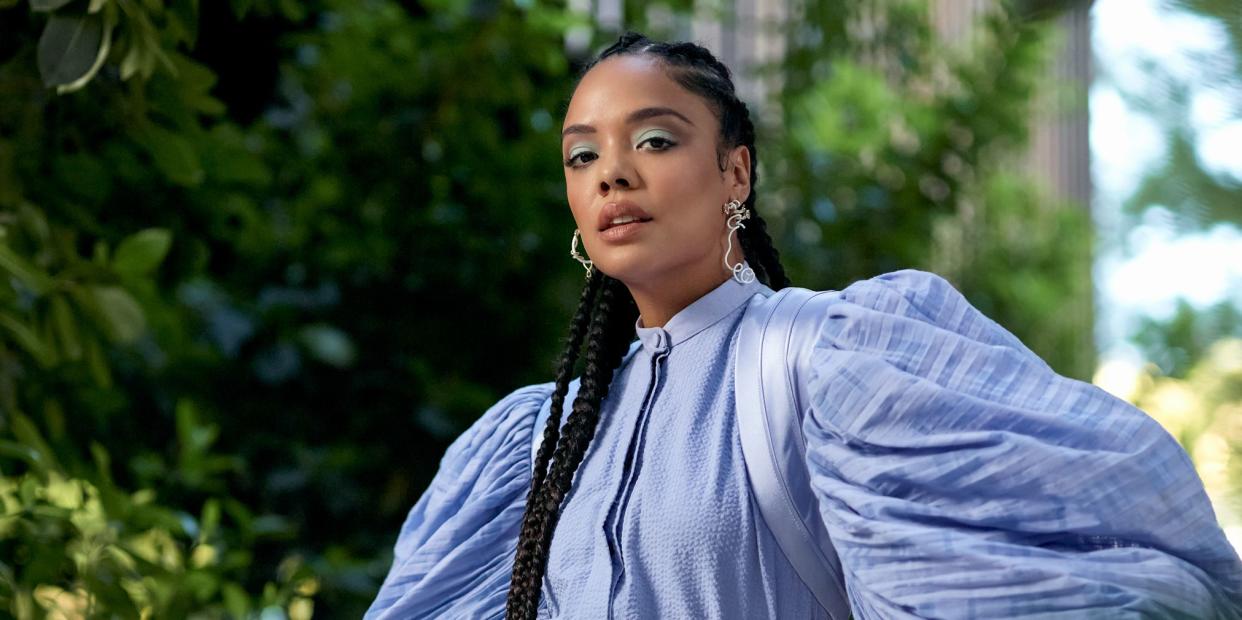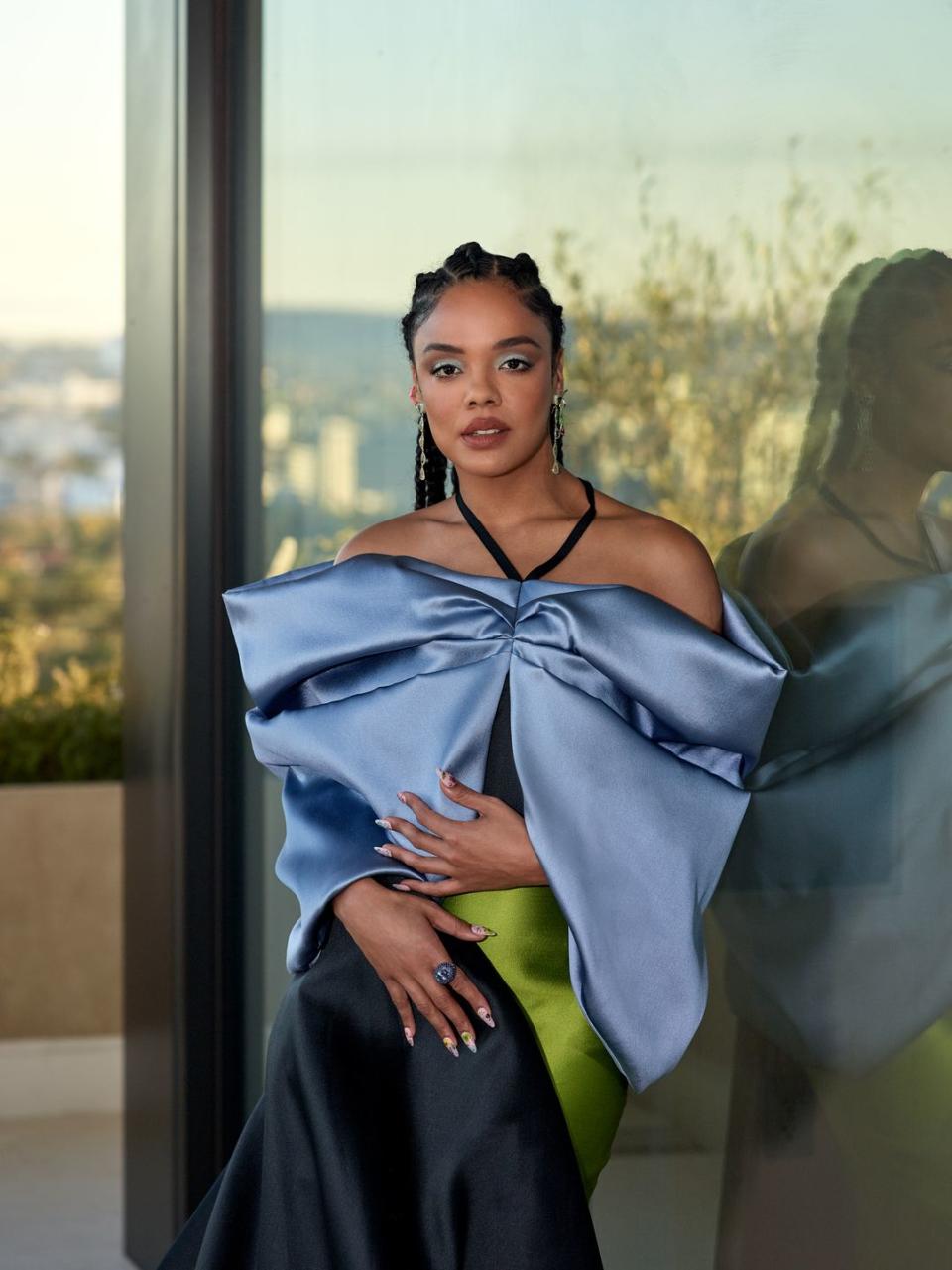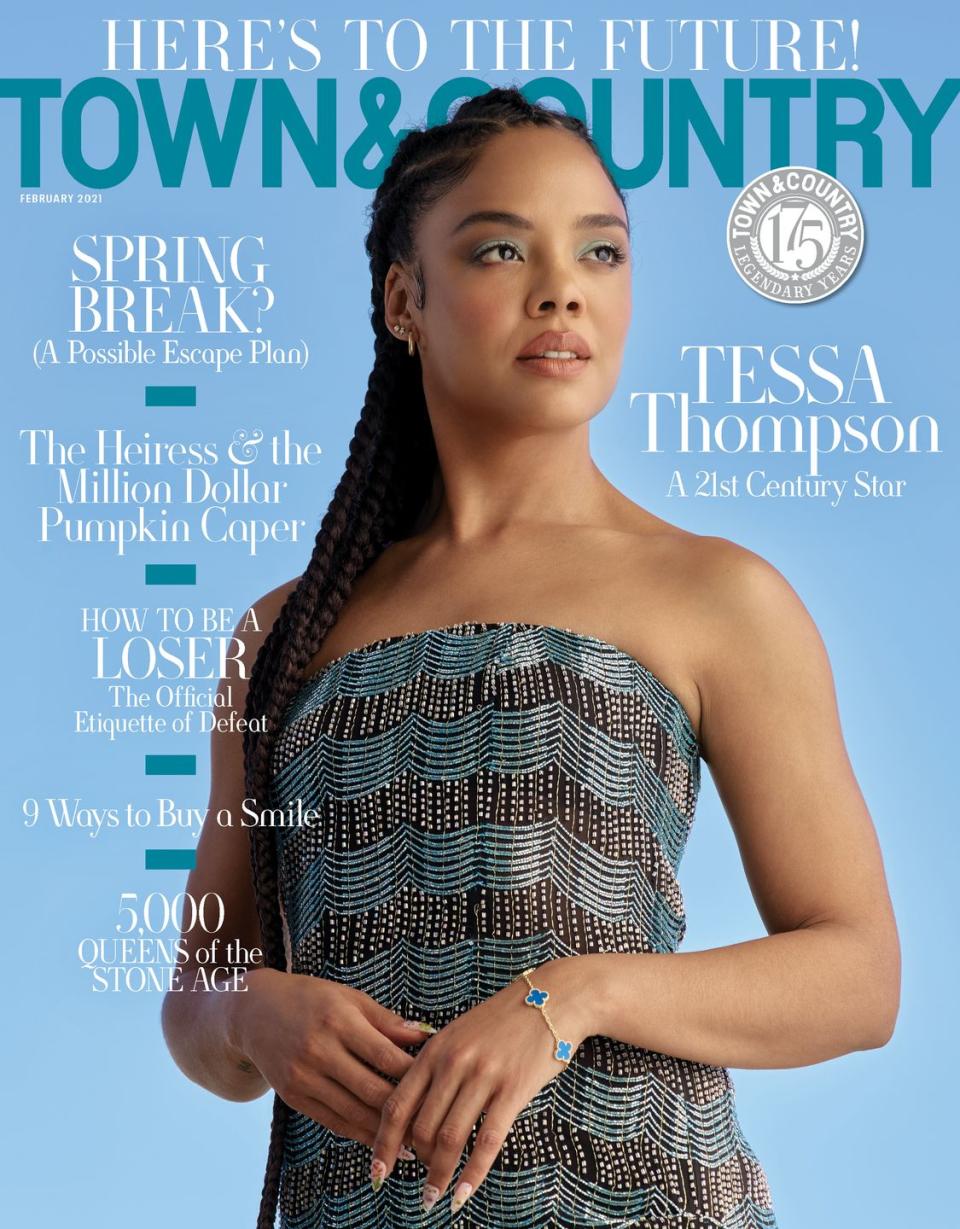The Talented Tessa Thompson

- Oops!Something went wrong.Please try again later.
"Hearst Magazines and Yahoo may earn commission or revenue on some items through the links below."
I’m not speaking to Tessa Thompson in person, and that’s honestly kind of a relief. It’s just before Thanksgiving, and Thompson is at home in Los Angeles, beautiful as ever, sitting in a chair with a knee pulled to her chest. We’re talking over Zoom and having a great conversation, but, given that this is how interviews take place these days, there’s no opportunity to witness a quirky encounter with a fan or to remark on her wardrobe or to see what and how she eats. Without superficial distractions, we’re able to get real and go deep.
During the initial moments of our conversation, Thompson remarks, “‘How are you?’ feels like a cruel question these days,” and indeed, she’s right. It’s late November, and while we’re past the 2020 presidential election, political uncertainty lingers. We are experiencing yet another surge in coronavirus cases, and the holiday season isn’t shaping up to be nearly as festive as it should be. “It feels like things have been turned inside out this year,” Thompson says. The world as it really is, she explains, “has been exposed in all its glory and gore, and maybe there is hope in that, in the sense that some of us are more awake than we have been.” The question becomes what we do, now that we’re more awake.
Thompson is aware that she’s expected to do something. After all, she is, at 37, one of the most visible performers of her generation. She is a star of action franchises like Men in Black and of Marvel movies; she has charmed audiences in independent films like Sorry to Bother You and Little Woods; she has appeared in TV series like Westworld and Dear White People; she records her own music; there’s a Twitter account dedicated to posting pictures of her with goats (more on that later). She’s got what you’d call a platform.

Thompson readily acknowledges the things that people expect of her. “We’re living inside this time where there’s an expectation, if you have some measure of a platform, to use it,” she says. “I’m not sure it’s that useful all of the time. If I have a microphone, maybe the most useful way is just to pass it on to someone that knows more than I do.” As she negotiates that balance of knowing when to speak and when to listen, one thing Thompson is definitely doing is putting her whole heart into work.
In her latest film, Sylvie’s Love—streaming now on Amazon—Thompson, who is both star and executive producer, demonstrates that. Deftly directed by Eugene Ashe, Thompson plays Sylvie, an ambitious young Black woman of privilege living in Harlem in the 1950s. She is watching television in her father’s record shop when she meets Robert (played by the handsome, finely chiseled Nnamdi Asomugha), a talented jazz saxophonist. Though Sylvie has a fiancé, she and Robert fall in love, but their relationship abruptly ends when Robert has an opportunity to advance his career in Paris. Instead of telling Robert how she feels and why he should stay, Sylvie stays silent, sacrificing herself for his benefit. Years later she is a budding television producer, with a husband called Lacy (Alano Miller) and a young daughter. She is trying to balance her nascent career and her family, and struggling to “have it all,” at a time when such a notion was rarely available to women. In one of the film’s more powerful moments, Sylvie tells Lacy, “I can’t be the woman of your dreams while also trying to be the woman of mine.” It’s the kind of love story Thompson never thought she would be able to make. “We haven’t necessarily gotten to see ourselves as the romantic leads, and when we have, particularly in period pieces, there’s less focus on the interpersonal, like how hard it is to be two humans trying to love each other,” she says. “There’s a lot of emphasis on historical context, which is, obviously, wildly important. I was conflicted as to whether it would work, whether you could tell a story like that.” Ultimately, Sylvie’s Love allowed Thompson to stretch her creative legs and to “do something that feels glamorous and sprawling, like the love stories you see in Hollywood iconography.”
Walk of Fame
A brief history of Tessa Thompson onscreen and on the red carpet.
Thompson was born in Los Angeles and grew up there and in Brooklyn. She began acting in high school and went on to Santa Monica College, where she majored in cultural anthropology. She’s well versed in any number of topics, and no matter where our conversation wanders, she speaks effortlessly but deliberately, clearly someone practiced in saying only what she means.
As an actress Thompson started out on stage, appearing in productions of The Tempest and Romeo and Juliet before landing her first TV role in an episode of Cold Case as Billie Ducette, a lesbian in the Prohibition era. In 2010 Tyler Perry was helming a remake of For Colored Girls…, and Thompson auditioned for a role after another actress dropped out; she got the job, and a new phase of her career began.
In her roles since then, Thompson has attempted to balance being the woman of an audience’s dreams with living a life of her own. But as her star rises, she is increasingly the woman of a great many people’s dreams. She has an ardent and diverse fan base. She once mentioned in an interview that she likes goats, and since then fans have showered the internet with pictures of her next to pictures of the barnyard animals; there’s a Twitter account called, as you might expect (or not), @TessaAsGoats.
— tessa as goats (@tessasgoats) April 28, 2020
No corner of Thompson’s fandom is more passionate than her queer following. Though she doesn’t explicitly identify as bisexual, in a 2018 interview she said she was “attracted to men and also to women.” For a community that rarely gets the representation it deserves, that was all it took. Few actors publicly express same-sex desire, so Thompson was quickly elevated to icon status. It means a lot to see an openly queer actor portraying a superhero, slaying her way through imaginary worlds.
Thompson’s devoted following is made up of movie fans and the fashion set alike. In 2018 she starred in Rodarte’s look book and attended the Met Gala wearing Thom Browne. The following year she was back at the gala in a Chanel dress, carrying a leather whip. Playwright Jeremy O. Harris recalls, “Her bondage look for the Met Gala was both playful and transgressive… She looked beautiful, but she didn’t look soft, which is often dangerous for a woman.”
This year Thompson brings something new to the screen in Sylvie’s Love. Her portrayal of Sylvie is as determined as any of her other performances, but she brings a tenderness to the part. There is genuine yearning woven through every move she makes. The movie is lush and beautifully shot against the backdrop of Harlem, and Thompson’s subtle performance soars.

Eugene Ashe chose Thompson for the role because he “was really looking for someone who could pull off an Audrey Hepburn–esque ethereal quality,” he says. “Tessa is generally supertough… Not that she doesn’t have agency in this film, she does, but it’s an arc where she gains agency over the movie. In some of her other roles, she comes as a fully formed badass. Here she grows into one.”
When Thompson and Ashe first met to discuss Sylvie’s Love, they agreed about the type of movie they wanted to make. A half-hour meeting, he tells me, turned into a two-hour lunch. They both wanted to make a love story centering Black people that was not consumed by race. And given the political climate, that is certainly…a choice. The movie is set before the signing of the Civil Rights Act of 1964, at the height of the movement; it seems impossible to elide race from the narrative. And at the same time, Sylvie’s Love offers audiences what so many have been craving: a story in which Black people can just be their fullest selves, for better and worse. We do indeed know what racism was like back then, and if we can expand our imaginations to believe that Thompson is a brash and bold Asgardian named Valkyrie who rides a winged horse, or the smoothly confident Agent M in Men in Black International, we can probably expand our imaginations to appreciate a midcentury love story between two Black people who keep trying to find their way to each other.
In the two Creed films Thompson played Bianca, a young woman dealing with progressive hearing loss who falls in love with Apollo Creed’s son Adonis. Her co-star Michael B. Jordan is effusive in his praise of Thompson. “She’s extremely talented, and a lot of the dynamics we had working together came from her asking the right questions and caring about the right things,” he says. “She always brought so much to the table and made us think outside the box. She challenged stereotypes, and she always made sure we were being true.”
Challenging norms is an integral part of Thompson’s ethic. A lot of people in Hollywood say they are going to change the industry, but Thompson is one of the few people who seems as if she actually will—as though she already is changing how business is done. Even early in her career she tried, in ways both great and small, to assert her autonomy in situations where she could not necessarily expect to have any. During auditions, when she was instructed to sit in a chair, she would deliberately move that chair, because she wanted to “remind myself and the room that I was going to take over the space.” Controlling that space, she says, “was definitely out of my comfort zone,” but there can be pleasure in the discomfort. “I think that’s why I like what I do. I’ve always felt a little afraid of what happens when we get too comfortable, that we’re not growing. Maybe I’m a masochist or maybe I’m a sucker for the discomfort of the first squeak.”
And Thompson is well aware that sometimes, for other people to be able to change, they need to see that change is possible. She observes that “there’s invariably people in the room that have been silenced. I remember a distinct moment on set. A squeak just came out of me, I didn’t even mean for it to, and then I could see the secret little smile on some of the women around the room, and you realize that there’s a choir of wheels waiting to squeak together. It emboldens folks, and you realize you have support and you’re not squeaking just on your own behalf. You’re squeaking for everybody.”
The Covid-19 pandemic has, at least for now, radically changed the entertainment industry. As acting work slowed down, Thompson used the opportunity to throw her energy into developing projects for other actors, and she is thinking about how those projects are executed. As work slowly resumes on film sets, a lot more care is being taken to promote distancing and hygiene. And, Thompson hopes, maybe that care will extend to the interpersonal dynamics and power structures. “Because we’re having to think about what safety looks like on set and having to be thoughtful,” she says, “I’m interested if that reverberates. I hope so, because there’s something audiences can sense inside of the DNA of the thing they’re watching that is actually powerful and useful.”
As she looks ahead and takes on more producing projects under her own banner—including a development deal at HBO and HBO Max for her Viva Maude productions that will see her producing adaptations of the novels Who Fears Death and The Secret Lives of Church Ladies—Thompson is thinking about new ways of doing business in Hollywood, and she’s thinking about ownership. “That’s my favorite thing to think about, particularly in building this company,” she says. “Thinking around the voices I invite into it, how I allow them to retain as much ownership over their work and their ideas as possible.” She hopes for film sets to become more collaborative, for them to become places where every voice can and should be heard. That may sound idealistic, but it’s worth considering why the idea of treating people who work hard equitably is considered an ideal. “I’m really interested in trying to create a utopia,” she says. “It’s imperative, because I’m curious about being able to give opportunity to folks that people might say are less experienced. A lot of people are batting a lot higher than their average because they just, frankly, haven’t been given the opportunity.”

Her upcoming projects include Passing, an adaptation of Nella Larsen’s Harlem Renaissance novel directed by Rebecca Hall and set to premiere at the Sundance Film Festival; Thor: Love and Thunder, due in 2022, and a third installment in the Creed series. A biopic of jewel thief Doris Payne (who is said to have used Town & Country for information about some of her greatest heists) is in development. It’s a collection of interesting, carefully chosen parts, which speaks to the care Thompson takes with her work and underscores just how exciting it will be to watch her continued ascent.
“In the beginning Tessa didn’t care to get too into the business side of things—having her own production company or getting more behind the camera,” Jordan recalls. “But now I’ve seen her grow into that and realize her power. She doesn’t need to limit herself by staying in front of the camera. The world needs to see her from all sides.”
Words by Roxane Gay Photographs by Erik Carter Styled by Wayman + Micah
Hair by Lacy Redway. Makeup by Kali Kennedy at Forward Artists for Dior 5 Couleurs Couture #279 Denim. Nails by Steph Shore at Forward Artists. Tailoring by John Thompson. Production services by Viewfinders LA. Shot on location at The West Hollywood EDITION.
Lead image: Loewe shirt ($4,900) and pants ($2,750); Bea Bongiasca hoop earring ($1,250 for pair) and ear cuff ($3,100); David Yurman ring ($10,000)
This story appears in the February 2021 issue of Town & Country.
SUBSCRIBE NOW
You Might Also Like

